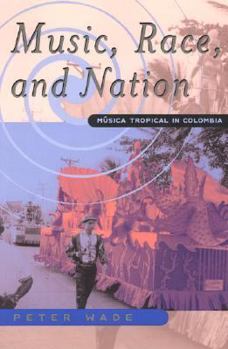Music, Race, and Nation: Musica Tropical in Colombia
Select Format
Select Condition 
Book Overview
Long a favorite on dance floors in Latin America, the porro, cumbia, and vallenato styles that make up Colombia's m sica tropical are now enjoying international success. How did this music--which has its roots in a black, marginal region of the country--manage, from the 1940s onward, to become so popular in a nation that had prided itself on its white heritage? Peter Wade explores the history of m sica tropical, analyzing its rise in the context of the development of the broadcast media, rapid urbanization, and regional struggles for power. Using archival sources and oral histories, Wade shows how big band renditions of cumbia and porro in the 1940s and 1950s suggested both old traditions and new liberties, especially for women, speaking to a deeply rooted image of black music as sensuous. Recently, nostalgic, "whitened" versions of m sica tropical have gained popularity as part of government-sponsored multiculturalism. Wade's fresh look at the way music transforms and is transformed by ideologies of race, nation, sexuality, tradition, and modernity is the first book-length study of Colombian popular music.
Format:Paperback
Language:English
ISBN:0226868451
ISBN13:9780226868455
Release Date:August 2000
Publisher:University of Chicago Press
Length:331 Pages
Weight:1.20 lbs.
Dimensions:0.9" x 6.0" x 9.0"
Related Subjects
Arts, Music & Photography Ethnic & International Ethnomusicology History Music Musical GenresCustomer Reviews
2 ratings
GREAT MUSIC, fair history
Published by Thriftbooks.com User , 18 years ago
This is the best description of the development of Colombian Música Tropical in English or Spanish. Once past the anti-capitalist anthropologicial jargon, it nearly conveys the infectious rhythms of Barranquilla's Carnaval. (Play a good Música Tropical album such as "Cumbia Cumbia" before reading.) The author is a anthropoligist and his views on Colombian history must be taken with caution. His views on race on La Costa are biased by his previous work in Antioquia and do not fully describe the fluidity of race on La Costa. The songs and albums mentioned provide a good start for a discography of Colombian Música Tropical. Unfortunately the author did not have Gabriel García Márquez amongst his sources. García Márquez has been a keen observer of Música Tropical. I first visited La Costa with my late triqueña wife, an excellent dancer from Barranquilla, and I was seduced by the rhythms and ambiance. The author seems to have been similarly affected. This is a "must have" book for lovers of "Música Tropical".
Will prove essential for any studying Columbian history
Published by Thriftbooks.com User , 23 years ago
This original, scholarly work will hold wide appeal to students of Latin American music and culture, and provides a unique study on the music of Columbia. This narrow focus goes far beyond most general 'world music' features to analyze the roots of the musical styles in that country, considering its rise, regional struggles, and the effects of local styles on Columbian politics and culture as a whole. Narrow, yes: but the focus will prove essential for any studying Columbian history.






